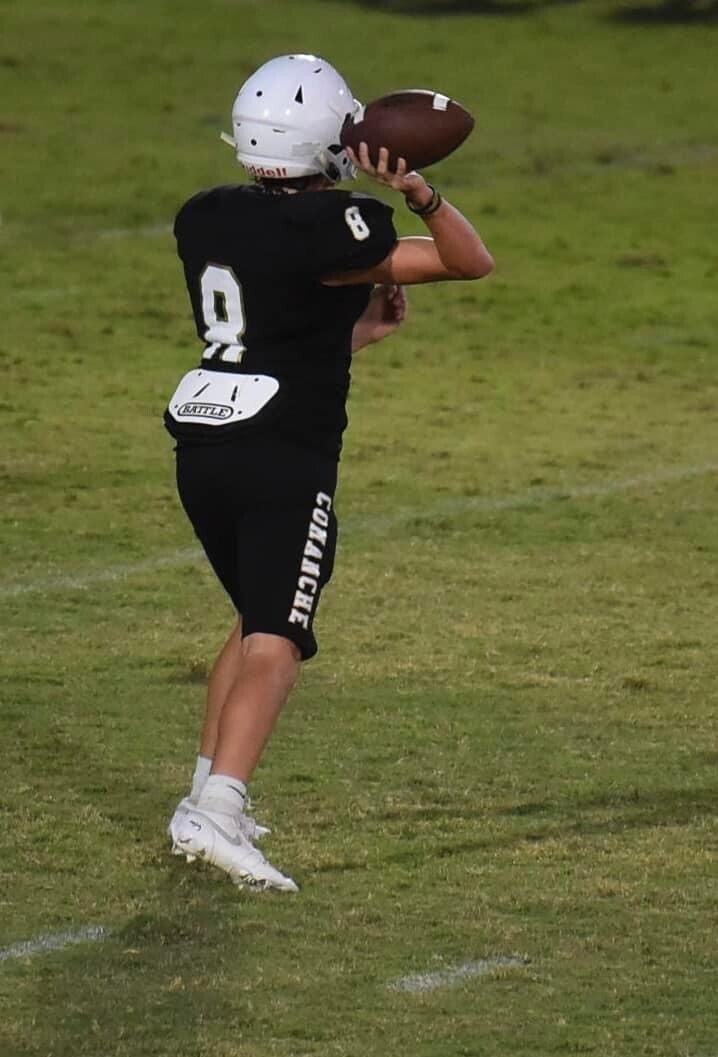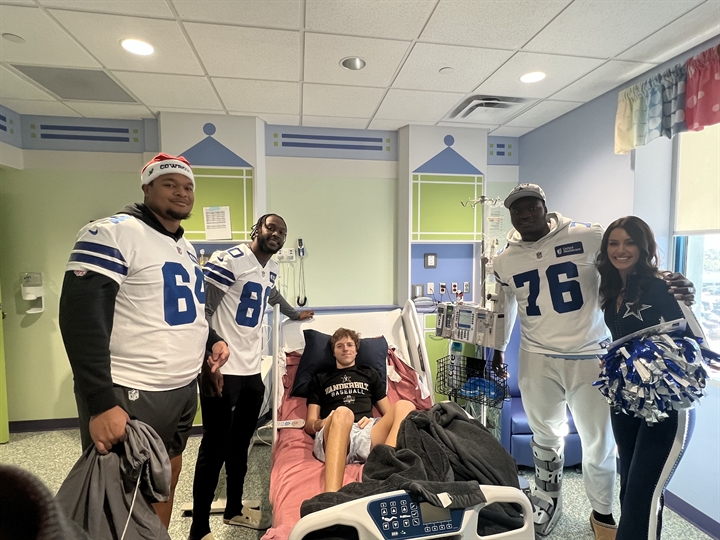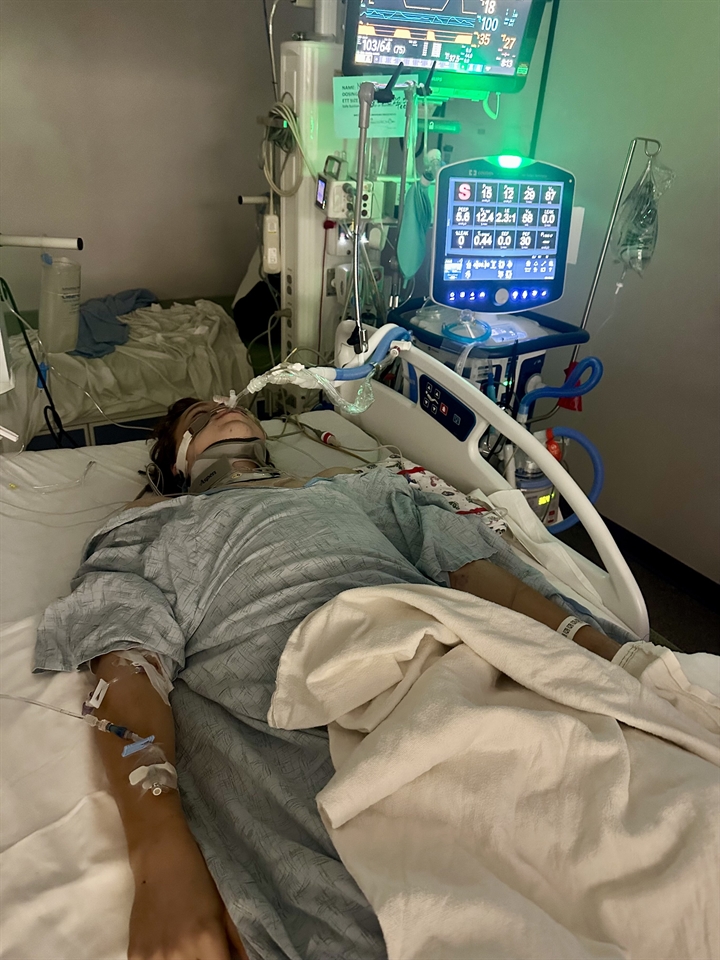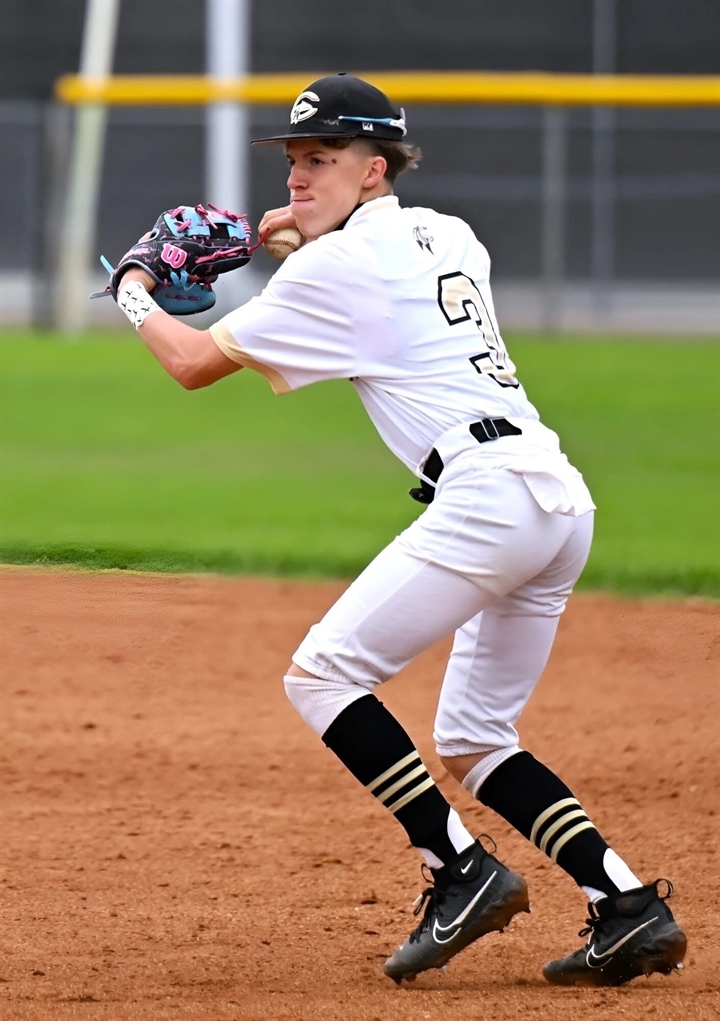Blake and Krista Munroe have watched the video of the football hit that nearly killed their son countless times.
They’ve shown it to everybody - friends, the Comanche High School coaches, the ICU staff at Cook Children’s, even to each other when they question if it was all some horrible nightmare.
It’s the same reaction every time.
Wait, that’s it?
During a November 5, 2024, practice, Comanche sophomore Colt Munroe lines up as an inside wide receiver and runs a quick slant across the middle of the field. Everyone is moving at half speed - it’s deep in the regular season, and playoffs are on the horizon. Colt jumps for the ball, hand extended. On his way down, the safety stands near his landing spot, two arms outstretched. Colt is defenseless. The safety could take his head off. Instead, he shoves Colt’s midsection like he’s playing two-hand touch letting everyone know he would’ve tackled Colt if this was a game.
It’s a play that happens at every practice at every school. Except when Colt gets up, he can’t catch his breath. Then he starts puking. And doesn’t stop. After a couple minutes, he tries to return. The coaches hold him out. It’s the first of several decisions that save Colt’s life.
After practice, as the football team trudges back to school for the rest of the day, Colt’s cousin catches him outside the locker room. Colt’s shoes aren’t on correctly. There’s dried blood on the corners of his mouth. His cousin asks him where he’s going.
“I’m going back out there,” Colt says.
“Bro, practice is over,” his cousin responds.
At lunch, Colt’s friends tell him he looks pale. He can’t feel his shoulder. It hurts to breathe. He texts his family group chat, asking if someone can pick him up.
This is the second event that saves him. Colt had his driver’s license and his own truck. But the family had to bring the truck into the shop the day before. It was the first time it’d ever given them trouble. So, Blake drove to the school to get him, thinking his son had broken a rib. If Colt had his truck, he would probably have told him to drive home and take some Tylenol. The doctor will later tell the family that if they’d gone to the emergency room thirty minutes later, he would’ve died.
Colt pukes during the X-ray, blood work and CT scan. Once his urine sample shows blood, the doctors realize it’s his spleen, the organ that acts as a blood filter next to the stomach. The doctors tell Blake and Krista they are CareFlighting Colt to Cook Children’s Medical Center in Fort Worth in 15 minutes. He’ll be in for a splenectomy surgery when his parents arrive, wake up a couple hours later, and then return home to Comanche that weekend.

None of that happened.
Blake and Krista hop in the car. Krista’s behind the wheel. Later, she’ll guess it was because she needed control over something after sending her baby in a helicopter with strangers. She flew 100 miles per hour down the highway, honking the horn, while Blake tracked Colt’s flight.
When they arrive, Cook Children’s informs them Colt has an active bleed in his spleen. In the following months, when the Munroes showed the doctors the play, every single one said Colt could redo it 10 million times and not have the result that happened next.
The first treatment option is a blood transfusion to see if the body can clot on its own. The second course is to remove the spleen. Level three is interventional radiology, going up through the groin and coiling the arteries feeding into the spleen.
Colt receives 10 units of blood through six blood transfusions. The trauma surgeon from that night tells the Munroes he doesn’t remember much of the night because of how chaotic the scene was and the sleep he lost after it. There are 10 nurses and three doctors in one ICU room. By 3:00 a.m., Colt’s blood pressure is 40/36, and his heart rate soars to 170.
Then, the hospital chaplain walks into the room.
“Oh my gosh, is it that bad?” Krista asks.
“I’m just making rounds,” the Chaplain says.
“Nobody makes f***ing rounds at 3:00 a.m.,” Krista says.

The transfusions aren’t working, and the doctors can’t remove the spleen without Colt bleeding out. So, they shift to Option 3: interventional radiology. Doing so requires Colt to be placed on a ventilator. Krista asks how long he’ll be on it. The nurse says it’s on Colt’s time - it could be hours or days.
Blake and Krista don’t know which was harder: the decision to put their son on the ventilator or seeing him hooked up to endless monitors and tubes. Colt cannot respond. He’s not really awake. But he can hear everything. The staff tells Blake and Krista it’s ok to be scared, but they can’t let Colt know they are. So, they try to keep their voice calm even though they’re jittery from their seventh cup of coffee and the experts in the room admitted they’re just hoping this works.
Krista is a second-grade teacher at Comanche Elementary School. Her principal and a fellow teacher both sent her Psalms 91:14. She sat by Colt’s bedside reading it over and over.
“He loves me.” says the Lord, “I will rescue him; I will protect him, for he acknowledges my name. He will call on me, and I will answer him; I will be with him in trouble; I will deliver him and honor him. With long life, I will satisfy him and show him my salvation.”
On her third time through, Colt squeezes her hand. It’s the first movement he’s made on the ventilator.
“Do you want me to quit reading you this Bible verse?” Krista asks.
“Uhhhh-Huhhhh,” Colt says.
By noon, his vitals are perfect.
Colt has powered through the worst, but he’s not out of the woods. The initial 48 hours were terrifying. The next 10 days were grueling.
Colt had to lie flat on his back for three days, long enough for the muscles to atrophy. His first physical therapy assignment is to sit up. The doctors use a rope around his back to pull him up, and he holds onto a harness over his head. The night before the hit, Colt was making protein balls to bulk up for baseball season. Now, he couldn’t walk down the hallway without one arm on his father and the other on the railing.
But in their family’s most trying time, the Munroes discovered how much their son meant to Comanche. They hadn’t spent six hours in the ICU before the Venmos rolled in. A GoFundMe launched the next day. The varsity moms on Comanche’s football team organize a weekly breakfast where men from the community eat with their sons. It was immediately changed to a “Breakfast of Champions for Colt,” with everyone donning blue bracelets, Colt’s favorite color.
“I thought we were going to come home and some people would cook us dinner,” Blake said.
It was a long road to recovery. Until it got worse.
…
Colt was throwing up and losing more weight in the two weeks he was home from the hospital. Some of that was to be expected. But on the night of the Texas-Texas A&M football game, Colt’s temperature reached 103 degrees.
The Munroes rushed to the hospital, where they found out Colt’s appendix had ruptured and was already abscessed into an infection. He went into surgery at 3:30 a.m. Meanwhile, his parents sat in the exact same hospital room they thought they’d escaped, wondering how this could be real life.

Before this entire ordeal, Colt was a 160-pound, two-sport athlete. In the days after the appendectomy, his weight dwindled to 121 pounds. The doctors said he was malnourished. His parents DoorDashed every restaurant in the Fort Worth area, trying to find him something that would work up his appetite.
Colt’s normal Whataburger order is a double meat cheeseburger, patty melt, fries and a milkshake. Now, he tapped out after two chicken nuggets and a fry. Krista went to Target for new clothes because the adult smalls were falling off him. At one point, the hospital handed him youth clothes. The nurses put food ornaments on the Christmas tree in his hospital room because they were concerned about his nutritional intake.
After the second abscess was cleared, Colt told his parents he was hungry. The switch had flipped.
His football coach, Jake Escobar, always told the team that it’s not about the size of the dog in the fight but the size of the fight in the dog. Colt’s collarbone might’ve jutted out because he’d lost so much weight, but he fought harder than ever. Sure, Colt complained about being stuck in the hospital room, but he never once asked why he was the one laid up in there.
“You always hope you’ve worked kids hard enough to where they can be tough when tough things happen,” Escobar said. “Colt, he bowed up. “That speaks highly of his character.”
…
Blake Munroe covers University of Texas baseball and women’s basketball and hosts the daily “Coffee and Football” YouTube series for OnTexasFootball. Legendary Texas quarterback Colt McCoy called his son while he was in the hospital to check in. He asked the younger Colt if he planned to play football again. “Yes sir,” Colt said without hesitation. The night he got off the ventilator, Colt asked his doctors if he could still play baseball this season.
A couple of weekends ago, Escobar was walking his dog past the high school when he saw Colt hitting off the pitching machine with two friends.
“I don’t know if I’d have seen that from him a year ago,” Escobar said.
Colt calls Escobar almost every day off from school asking if the weight room is open. Six months after rupturing his spleen, he’s a catcher on the baseball team. He’s in better shape now than he was before, attacking every day like a man who now knows all too well it could be his last. Next fall, he’ll play varsity football.
“He’s second string right now,” Krista said. “I wish he’d be fifth string.”
Colt has been cleared to play by every doctor. But Blake and Krista have had heated discussions about whether to let him. Their son wants to live the same life he had before the hit. His parents will never forget everything that happened after it.
A couple days after the accident, they asked Colt if he was ever scared he would die on the CareFlight to the hospital.
“If it’s my time to go, God will take me,” Colt said. “There’s nothing you can do to stop it.”
In these moments, it's the parents turn to look up to their son.
“I’m probably going to be called stupid by a lot of people for saying this, but I almost think it’s admirable,” Blake said. “A lot of people would be scared. They wouldn’t want to go back and do what caused them so much pain and grief.”
Colt proved himself a warrior over the last six months. Sports put him in the hospital, but sports also got him out. The goal of returning to the field got him through the hardest days. The lessons learned from Comanche athletics gave him the tools to persevere.
“I know there’s a lot of people who aren’t going to agree. I don’t even agree,” Krista said. “But at the same time, what do you do? He fought hard. He did what he was supposed to do. He has peace about it all.”
Colt looks the same, if not better, than he did before the accident. But he’s a different kid now. All the changes are internal. He lost his spleen and appendix but gained a new appreciation for life. No matter how the rest of his athletic career pans out, Colt Munroe has already won.
“He was a great teammate, but he’s become an even better teammate now,” Escobar said. “His input on the team will be even greater than anything he does on the football field.”

This article is available to our Digital Subscribers.
Click "Subscribe Now" to see a list of subscription offers.
Already a Subscriber? Sign In to access this content.
